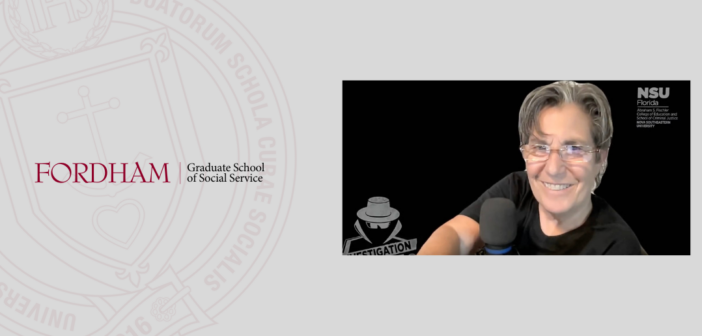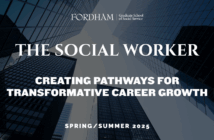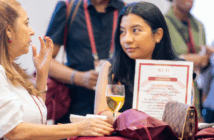Three months after graduating with her Ph.D. in Social Work from the Graduate School of Social Service, Grace Telesco’s home city was attacked. Thick black smoke choked the air. Fear ran through the streets like loose electricity. The date was September 11, 2001.
Telesco was an 18-year veteran of the New York Police Department (NYPD). Armed (no pun intended) with a new doctoral skillset, her role as a police officer was about to shift. For the following 18 months, instead of making arrests, she’d lead a team to counsel families in crisis.
“My chief knew that I was getting the Ph.D. in Social Work with a mental health specialization—I was in charge of the crew that had some experience in this area to interact with the community,” she said. “[There] was a lot of crisis, shock, denial, disbelief, anger…a lot of blaming.”
Distress defined the Ground Zero scene. Victims and families trying to heal also had to navigate a bureaucratic system of available services that was, at best, confusing and, at worst, broken. Telesco was charged with assisting them and received some help from her newly minted alma mater.
“Fordham University folks at the Graduate School of Social Service came out to assist in those early days,” she said. ”They volunteered to be psychological first aid at the scene. That went on for about a year. The final six months were dedicated to debriefing and providing stress management seminars for all of the cops who worked for me.”
After the Ground Zero assignment, Telesco would continue a career that included working in New Orleans after Hurricane Katrina, becoming a full-time professor, and starting her own podcast. We sat down to speak about the medley of roles she’s played—and continues to play—in her time at the intersection of social work and criminal justice.
Raised a Helper, Dedicated to Service
Telesco said her father—a New York City bus driver—instilled in his children the importance of public service, and the contributions civil servants make to society. The message stuck; Telesco’s brother and sister both became social workers, and she joined the NYPD when she was only 23.
Inexperience wasn’t the only challenge Telesco faced while getting acclimated to her new job. She said her identity as a female also gave her issues—with her colleagues and even the civilians she was hired to protect.
“Civilians would be more apt to talk to the male partner than to me,” she said. “You had to prove yourself to everyone [and]that you were competent—that you earned the job.”
It was an unfair systemic bias that Telesco also saw applied to her colleagues of color. She said while things have improved since the 80s, they are far from perfect.
“I mean, look at Kamala Harris,” she said. “She’s got a lot of proving to do, and this is 2024.”
Despite the societal disadvantage, Telesco was no stranger to hard work. She quickly earned respect and cultivated a name for herself among the NYPD. In 1996, she was appointed to serve as the commanding officer of the NYPD’s recruitment section.
While supervising an NYPD recruitment table at a career fair, Telesco discovered a booth for the Jesuit University of New York. Looking back, Telesco said social work values were inside her—she just needed an outlet to explore them. Five years later, she defended her doctoral dissertation at GSS.
“The concepts and values of social work were something that I always embodied. I just didn’t have a name for it necessarily,” she said. “The social work piece, I think, came from loving community policing. I loved interacting with the community.”
Teaching Techniques
Telesco is now a professor of Sociology, Social Work, and Criminal Justice at Nova Southeastern University (NSU) and the director of its Criminal Justice program. She thinks the decades spent in the NYPD give her an additional advantage when connecting with the student body—who are increasingly looking for real-world-applicable advice.
“I feel like practitioners know how to bridge the gap between theory and practice,” she said.
Telesco is the faculty adviser for NSU’s Sociodrama Club: Stage for Change. The group conducts workshops utilizing sociodrama, a method by which a group of individuals select and spontaneously enact a specific social situation common to their experience. Sessions have been held for police officers, social workers, and dental students in the past—and have won multiple awards. However, Telesco says the real award is the impact on those who attend.
“We did [a session]on suicide prevention and suicide awareness last summer,” she said. “After it was over, I had an audience member come up to me and the group crying, saying she was on her way to the program with her kid and she wanted to run her car off the road—and that as a result of what we did, she recognized that she needs help, and that she really wants to get it. It doesn’t get any better than that.”
Telesco has been doing some style of sociodrama technique teaching since her time as an instructor within the NYPD Academy back in 1985. Its effectiveness continues to inspire her, so she continues to lean in.
“I really believe in it. I think it works,” she said. “We’re making some difference.”
Her next session with Stage for Change will be on September 10.
What’s Next?
In addition to leading the Stage for Change crew and completing her professorial and directorial duties, Telesco keeps piling onto her crowded plate. Her podcast, Investigation with Dr. T, is gearing up for its newest season—which will feature guests such as former Aerosmith guitarist Richie Supa, and two “Homeboys” from Father Gregory Boyle’s Homeboy Industries, the world’s largest gang-intervention, rehabilitation, and re-entry program. The podcast is live-streamed on the NSU YouTube page, and the first episode is on September 3.
“We have a great season coming up in September—I’m calling it my ‘empowerment season,’” Telesco said. “[It will be] focused inmate graduates [who received]second chances through education programming.”
In addition, Telesco is putting the research skills she learned in her Ph.D. programming to good use in a few different projects. One of them is a qualitative study that examines the perceptions and lived experiences of survivors of the 2018 Parkland Shooting Massacre.
Telesco’s post-NYPD career is just as eclectic and exciting as her time in the force, because the goals have always been the same—service, connection, and community. Making a difference. And while her time at Fordham may have been a small chunk of a life filled with meaning, Telesco fondly remembers how it allowed her to branch out even further and expand on what means most.
“Fordham means everything to me,” she said. “I don’t think I would be where I am today if I didn’t have my Ph.D. in Social Work.”



